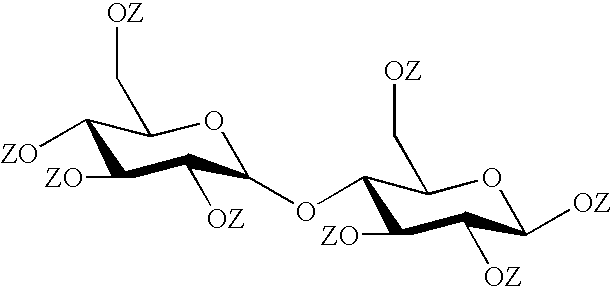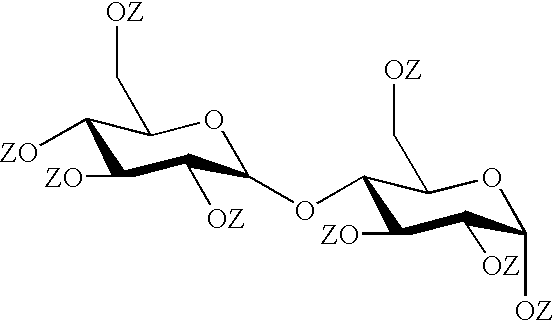Cosmetic compositions
- Summary
- Abstract
- Description
- Claims
- Application Information
AI Technical Summary
Benefits of technology
Problems solved by technology
Method used
Image
Examples
example 1
[0159] Synthesis by an anhydride route
[0160] Maltose was fully esterified to its octadodecanoate derivative following a procedure generally described by Wolfram and Thompson, Methods Carbohyd. Chem., Vol 1 (1962) 334-5. The following procedure leads to the material designated L19 in a table set out after Example 2 below.
[0161] Sodium dodecanoate was dried in a vacuum oven at 40.degree. C., in the presence of P.sub.2O.sub.5. All glassware was dried overnight in an oven.
[0162] A suspension of sodium dodecanoate (2 g, 9.22.times.10.sup.-3 mol) and dodecanoic anhydride (30 g, 7.84.times.10.sup.-2 mol) was heated to 70.degree. C. under nitrogen. This gave a white viscous solution.
[0163] Pulverised D-maltose, 40% .alpha.-anomer and 60% .beta.-anomer (1.6 g, 4.4.times.10.sup.-3 mol) was added and the mixture was stirred vigorously at 70.degree. C. After 15 to 30 minutes the temperature was increased and kept between 100 and 105.degree. C. for 24 hours. The mixture was then cooled to room t...
example 2
[0170] Synthesis by acid chloride routes
[0171] Maltose was esterified by the following procedure to give a product of 50% fully esterified maltose, (sample L2 in the table below).
[0172] D-maltose monohydrate, (60% .beta.-anomer, 40% .alpha.-anomer) (10 g, 0.028 mol) was finely powdered in a mortar and then placed in a reaction vessel with 200 ml toluene and 30 ml of pyridine. A catalytic amount (100 ml) of 4-dimethyl aminopyridine (DMAP) was also placed in the reaction vessel. The contents of the vessel were stirred at room temperature and decanoyl chloride (52.3 ml, 0.252 mol) dissolved in 100 ml toluene was added dropwise over a period of one hour.
[0173] Stirring was continued for 24 hours after which the mixture was filtered to separate the solution containing the product from precipitated pyridinium chloride. The precipitate was rinsed with more toluene. The combined toluene solutions were then washed with water and with 5% aqueous cupric sulphate, dried over magnesium sulphate ...
example 2a
[0176] Maltose octadodecanoate (50% .beta., L17) was prepared by the following method. D-maltose monohydrate was dissolved in 1-methyl-2-pyrrolidone and the water was removed by azeotroping with toluene.
[0177] 450 ml of the 1-methyl-2-pyrrolidone solution containing 28.5 g of maltose was placed in a reaction vessel and stirred with 160 ml pyridine and 101 ml 4-dimethyl aminopyridine. 181.5 g of dodecanoyl chloride was then added slowly over a period of 1.5 hours. The reaction was then mixed at room temperature for a further 16 hours. During this period a solid precipitated out, which was filtered off and discarded.
[0178] Excess pyridine was then removed by rotary evaporation. At this stage the dark brown mixture was split into two batches for further work-up.
[0179] 400 ml of water was added to one portion of the dark brown mixture, and the mixture was vigorously shaken. 400 ml of ethyl acetate was added and the mixture shaken in a 2 liter separating funnel. Two layers separated out ...
PUM
| Property | Measurement | Unit |
|---|---|---|
| Fraction | aaaaa | aaaaa |
| Fraction | aaaaa | aaaaa |
| Percent by mass | aaaaa | aaaaa |
Abstract
Description
Claims
Application Information
 Login to View More
Login to View More - R&D
- Intellectual Property
- Life Sciences
- Materials
- Tech Scout
- Unparalleled Data Quality
- Higher Quality Content
- 60% Fewer Hallucinations
Browse by: Latest US Patents, China's latest patents, Technical Efficacy Thesaurus, Application Domain, Technology Topic, Popular Technical Reports.
© 2025 PatSnap. All rights reserved.Legal|Privacy policy|Modern Slavery Act Transparency Statement|Sitemap|About US| Contact US: help@patsnap.com



